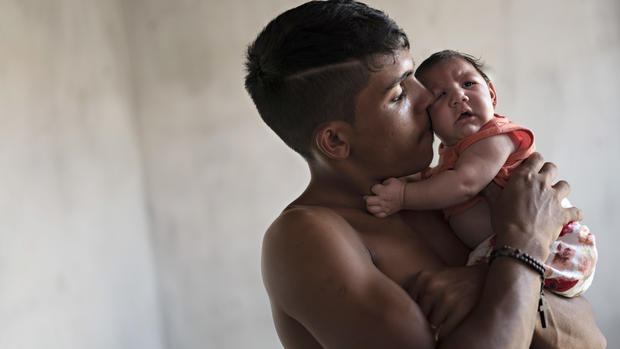Is Colombia on the verge of a Zika-linked wave of birth defects?
Brazil was the first country to report a surge in newborns with microcephaly that parallels the recent outbreak of Zika virus. But Colombia may not be far behind.
The Nature news site reported today that researchers in Colombia have identified their first cases of birth defects believed to be linked to Zika. The findings could signal the beginning of a wave of Zika-related birth defects in that country, which lies in the upper northwest corner of South America, adjacent to Brazil.
The virus was first reported in Brazil in the spring of 2015, although it's believed to have started spreading the year before. It wasn't reported in Colombia until last September.
One newborn baby in Colombia has now been diagnosed with microcephaly -- an abnormally small head -- and two other babies have congenital brain abnormalities, Alfonso Rodriguez-Morales, told Nature. Rodriguez-Morales chairs the Colombian Collaborative Network on Zika (RECOLZIKA), which made the diagnoses.
He said all three babies tested positive for the presence of Zika virus. The scientists have submitted a report about their findings to a scientific journal.
Scientists have found the Zika virus in amniotic fluid, in the cerebrospinal fluid of affected babies and in the brains of stillborn and aborted fetuses after the detection of severe malformations during pregnancy.
Rodriguez-Morales, an infectious-diseases epidemiologist at the Technological University of Pereira in western Colombia, told Nature they expect to see an uptick in cases of Zika-linked birth defects in the next two or three months.
The RECOLZIKA network of researchers and public-health institutions across Colombia are investigating a handful of other suspected cases of Zika-related microcephaly.
The concern is that Colombia will follow the pattern of Brazil, which first reported a microcephaly link to Zika in October 2015. Since then, health officials in Brazil have reported more than 4,000 suspected cases of microcephaly, which can result in mental disability and lifelong health problems.
The World Health Organization says health officials in French Polynesia, which was also affected by a Zika outbreak, identified an increase in the number of fetuses and babies with unusually small heads there, too. There is "very high suspicion" of a link between the Zika virus and microcephaly in French Polynesia, Dr. Didier Musso, an infectious disease specialist at the archipelago's Institut Louis Malardé, told The New York Times. But he said additional research was still needed.
Infectious disease physician Dr. Daniel Lucey, an adjunct professor of medicine at Georgetown University School of Medicine, told CBS News, it's not a surprise that birth defects related to Zika may now be appearing in Colombia.
"But still, until it happens, you want to hope that it's not going to happen," he said.
It's preliminary, though, not based on the official report itself, which has been submitted for publication, Lucey added.
Lucey said now is the time to act; that having seen "proof of concept" in Brazil, health organizations need to prepare countries that are seeing Zika infections, especially in pregnant women, and be prepared for potential newborns with birth defects eight months down the road, if not sooner.
Based on World Health Organization and Pan American Health Organization data, Lucey speculated that other countries could see increases in Zika-related birth defects soon, and may include Suriname, Panama, El Salvador, Guatemala, Paraguay, Venezuela, and Honduras.
He added that while a lot of the focus has been on Latin America, health officials need to keep their eye on West Africa as well, and Cape Verde in particular where they're reporting an epidemic of Zika.
"There needs to be close monitoring like Colombia's done," said Lucey, noting that Columbia set up a registry of women with Zika who were pregnant, as well as care services.
"It's not good enough to predict, you have to take appropriate actions."
Meanwhile, Columbian officials have in place health monitoring efforts for pregnant women as the mosquito-borne outbreak continues to unfold.
